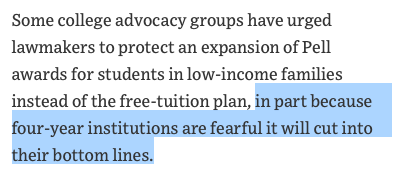
Just once, I'd like to read a McWhorter column fashioned out of something other than straw. This one is a master class in question begging. 

For the record, I agree that making people feel guilty is not a great approach to anti-racism, but the piece assumes that making whites feel guilty - specifically for things in the past - is an explicit goal of anti-racist movements. This isn't true.
"Feeling bad" about what happened in the past is not the same thing as assigning or engendering guilt. I feel bad about the Tulsa Race Massacre. I feel bad that our public higher education system was established in a way to purposefully exclude Black students.
While I feel bad about that stuff, I don't feel any guilt because I wasn't around for it, had no agency in the outcome, and also don't have a time machine that would allow me to go back and intervene at the origins of those problems.
What I do feel, based on the knowledge I have of these systemic inequities, is a sense of responsibility to try to address these problems so that subsequent generations of people are not subject to the same structural barriers. Responsibility and guilt aren't synonyms.
The idea that progress can only be made if enough white people feel guilty is not a principle I'm aware of in the anti-racist readings and movements I've come in contact with. Maybe it exists. It is not the core of the movement.
The idea that the impulse to act to address injustice comes out of guilty about what happened in the past is not supported by any evidence. McWhorter's reading of the Civil Rights era is...odd. 

I know that structural racism exists because I have witnessed it in the world I'm most familiar with, education. @AdamHSays traces the roots of these problems in higher education in his brilliant new book. bookshop.org/a/1793/9780062…
As @AdamHSays notes, Auburn had more Black students 20 years ago than it does today. The percentage of Black tenured faculty has barely budged. The causes can be found in the exclusions of Black people at the origination of these institutions. 

Nobody needs to feel guilty about this, but a failure to recognize it and an unwillingness to try to do something about it is complicity in perpetuating an injustice. If people believe the rhetoric of higher ed institutions as places of opportunity, this must be addressed.
Does that make me "woke?" Who gives a shit? This is a tangible problem doing daily harm to people. We know the problem and have identified solutions. I don't feel guilty. I'm angry.
In his new column, @jbouie captures my personal sentiments well. If Black students have to encounter racism, white students should at least have to learn about it. nytimes.com/2021/10/30/opi…
• • •
Missing some Tweet in this thread? You can try to
force a refresh








